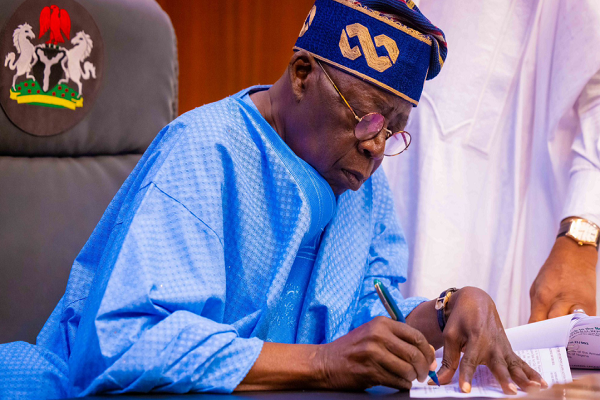…Gives real reasons for subsidy removal
//ONYEKA-AJUMOBI ONOCHIE//SHARE THIS
Nigeria spent $13 trillion on petrol subsidy in six years, according to the Nigerian Extractive Industries Transparency Initiative (NEITI ) Executive Secretary, Dr Orji Ogbonnaya Orji.

–Dr Orji Ogbonnaya ORji, ES/CEO, NEITI
……………..
The fund, he said, is equivalent to the country’s entire budget for agriculture, education and defence in five years.
It equals the total capital expenditure in the 10 years between 2005 and 2021.
Orji who spoke during the “Policy Dialogue on Oil Swap” in Abuja, said the subsidy regime discourages private sector investment in downstream.
According to him, the full deregulation of the petroleum sector will end the clamour for subsidy removal.
Orji said there was an urgent need to make a decision on the issue, stressing, that the full deregulation of the petroleum sector will permanently lay to rest the conversation around oil swaps.
“NEITI’s latest policy brief titled ‘The cost of fuel subsidy: A case for policy review’ revealed that Nigeria expended over N13 trillion ($74 billion) on fuel subsidies between 2005 and 2021.
“The figure in relative terms is equivalent to Nigeria’s entire budget for health, education, agriculture, and defence in the last five years, and almost the capital expenditure for 10 years between 2011 and 2020.
“It is also important to note other economic opportunity costs of fuel subsidy which include among others slashing allocations for the health, education, and technology infrastructure sectors; deterioration of the downstream sector with the declining performance of Nigeria’s refineries and recording zero production in 2020; disincentivized private sector investment in the down and mid-stream petroleum sector; low employment generation since the refining process is done outside the shores of Nigeria; worsening national debt; declining balance of payment, forex pressures and depreciation of the Naira and of course product losses, inefficient supply arrangements-scarcity and its attendant queues etc.”
Orji said in the 12 years between 2009 and 2020, Nigeria lost N16.25 trillion to crude oil theft.
“The NEITI policy brief on crude oil theft and data pulled from NEITI industry reports of the oil and gas sector showed that between 2009 and 2020 (12-year period), Nigeria lost 619.7 million barrels of crude oil valued at $46.16 billion or N16.25 trillion,” he said.
The Executive Secretary explained that the volume of crude oil losses represents a loss of more than 140 thousand barrels per day.
He added that between 2009 and 2018, Nigeria also lost 4.2 billion litres of petroleum products from refineries valued at $1.84 billion.
Orji added that these findings and recommendations on tackling crude oil theft have been submitted to the President through the Presidential Committee on Crude Oil Theft in which NEITI also served as a member.
The committee, according to him, has concluded its work and submitted its report to the President, Muhammadu Buhari.
On oil swap, Orji recalled that it started when the Nigeria National Petroleum Company (NNPC) Limited used to receive a daily crude allocation of 445,000 bpd from the government to refine for domestic consumption.
He, however, noted that the near-total collapse of the country’s four refineries meant that the NNPC could not refine the 445,000 bpd Domestic Crude Allocation (DCA).
According to him, NNPC exported most of the crude and then depended on the Pipeline Products Marketing Company Limited (PPMC) or private oil marketers to import refined products.
He said it led the country into huge debts and did not guarantee sustained imports of refined products to meet domestic demand.
The debts, he noted, got so heavy, and refined products were scarce with long queues at petrol stations nationwide.
Orji said the government had to find innovative and less expensive ways of making refined petroleum products available for the citizens.
He said in 2010, the NNPC introduced oil-for-product swaps as a solution to this problem.
Orji added: “Oil-for-product swaps are complex barter transactions in which NNPC and private traders swap crude oil for refined petroleum products, rather than for money.
“The NNPC adopted two kinds of swaps: Offshore processing agreement (OPA) in which a refiner or trading company enters a contract to lift a specified volume of crude (with clear terms on the expected product yields), refine it abroad, and deliver the resulting refined products back to the NNPC.
“The refining company also can pay cash to NNPC for any products that Nigeria does not need.”
The Executive Secretary said the second is the Crude-oil-for-Refined-Product Exchange Agreement (RPEA) in which crude is allocated to a trader, who is then responsible for importing refined products to match the value of the crude, less agreed to fees and expenses.
Orji, however, noted that these swap deals were not sustained as there were major operational changes within the NNPC on the management of domestic crude allocation in 2016.
He recalled that Direct Sale Direct Purchase (DSDP) replaced Offshore Processing Arrangement (OPA) with effect from January 2016 and a functional unit was created within the Crude Oil Marketing Division to manage the DSDP.
Orji was hopeful that the crude oil swap will become history upon the full deregulation of the petroleum sector.(agency)/SHARE THIS
- Tags: Orji Ogbonnaya Orji, NEITI, NNPCL, Oil subsidy
ADVERTISEMENTS

*Resourcing our various platforms targeted at emerging sectors – renewable energy, sustainability, innovation, and healthcare – aimed at ensuring the Authority achieves its dual objectives of delivering financial returns and impactful social outcomes.**************************************






